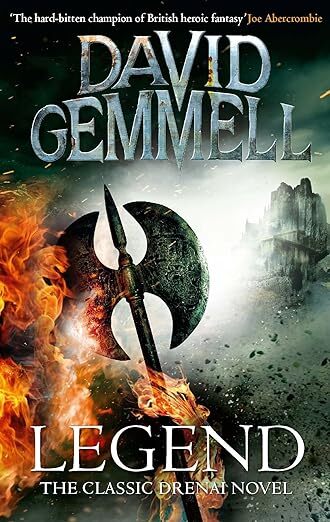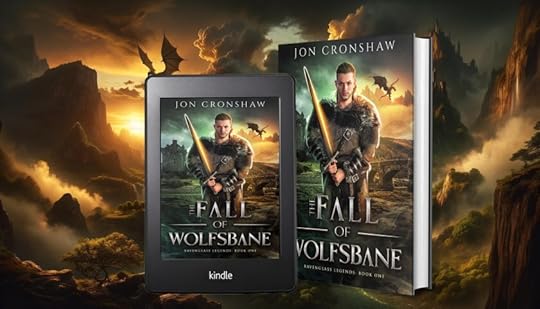The Unyielding Blade: David Gemmell’s Lasting Edge on Modern Fantasy
In the grand arena of modern fantasy, where authors duel with pens mightier than swords, one champion’s legacy remains as enduring as the legends he spun: David Gemmell.
Known for his rugged heroes, moral complexities, and a distinct blend of myth and muscle, Gemmell didn’t just write fantasy novels; he forged them in the fires of his indomitable imagination.
Let’s stride through the mist of time (without tripping over our cloaks) to examine how this master of heroic fantasy left an indelible mark on the genre.

For those unacquainted with his work, David Gemmell stands as a colossus in the realm of fantasy literature, renowned especially for his iconic ‘Drenai’ series among numerous other novels.
Born on August 1, 1948, in London, England, Gemmell’s journey into the world of fantasy writing was as storied as his novels.
Raised in a tough urban environment, he encountered struggles early in life that profoundly shaped his worldview and later, his writing.
His tales, rich with valiant warriors and epic battles, mirrored his own battles with adversity, echoing a theme prevalent throughout his life: the triumph of the human spirit against overwhelming odds.
Gemmell’s foray into writing was somewhat serendipitous.
His career began in journalism, but it was a false accusation of involvement in a robbery that prompted him to write his first novel, ‘Legend’, as a means of coping with the stress of the situation.
Published in 1984, ‘Legend’ launched him as a formidable voice in fantasy fiction.
His stories delve deeper than mere whimsical escapades; they are gritty narratives that explore themes of heroism, redemption, and the eternal struggle between light and darkness.
Gemmell’s characters were often flawed, burdened with complex moral dilemmas, and faced with the kind of difficult choices that define us as human beings.
This approach was heavily influenced by his personal experiences and his belief in the inherent resilience and nobility of the human spirit, even amidst darkness and despair.
In Gemmell’s world, heroes were not born; they were forged in the crucible of adversity, often battling inner demons as fierce as the dragons they faced.
His protagonists, such as Druss the Legend and Waylander, became archetypes of the genre, embodying a rugged, morally complex heroism that resonated deeply with readers.
Throughout his career, Gemmell’s works continually explored these themes, earning him a devoted following and critical acclaim.
His novels often drew inspiration from historical events and mythology, blended with his unique brand of storytelling.
The blend of historical realism with fantasy elements became a hallmark of his work, setting his novels apart in a genre often dominated by more traditional high fantasy narratives.
David Gemmell’s legacy in the world of fantasy literature is undeniable.
Before his untimely passing in 2006, he authored over thirty novels, each one contributing to a body of work that has left an indelible mark on the genre.
His influence extends beyond his novels, inspiring a generation of writers and readers who find solace, inspiration, and strength in the tales of heroes who, like Gemmell himself, faced the darkness and emerged triumphant.
Carving a Niche: Gemmell’s Brand of FantasyGemmell’s influence in fantasy is akin to a masterfully wielded axe – sharp, undeniable, and leaving a mark.
He veered away from the high fantasy of elves, orcs, and distant, ethereal magic, grounding his tales in a realism that was both brutal and beautiful.
His heroes were flawed, relatable, and profoundly human, a stark contrast to the near-perfect paragons often depicted in fantasy narratives.
This approach resonated with readers, offering a more down-to-earth, gritty version of heroism.
One of Gemmell’s lasting impacts is his contribution to the archetype of the solitary, brooding hero – think Druss the Legend or Waylander.
This character type, the lone wolf with a troubled past and a heart of gold, has become a beloved staple in fantasy literature and media, influencing countless authors and creators in their portrayal of complex, anti-heroic protagonists.
Another Gemmell hallmark is the moral ambiguity he wove into his narratives.
In his worlds, the line between good and evil was often blurred, with heroes making questionable decisions and villains showing glimpses of humanity.
This nuanced approach to morality has become increasingly prevalent in modern fantasy, encouraging a deeper exploration of characters’ motivations and the ethical landscapes they navigate.
A Legacy ContinuedEven after his passing, Gemmell’s influence continues through the David Gemmell Awards for Fantasy, established to celebrate the best in fantasy fiction.
Though the awards concluded in 2019, they played a significant role in recognising and promoting excellence in the genre, a testament to Gemmell’s enduring impact.
David Gemmell may have left our mortal plane, but his influence on fantasy literature is as alive as a Drenai warrior’s spirit.
He redefined heroic fantasy, giving us characters and stories that were not just escapades of escapism but reflections on heroism, sacrifice, and the human condition.
In the pantheon of fantasy greats, Gemmell stands tall, a solitary figure watching over a genre he helped shape with the might of his imagination and the strength of his tales.
 follow jon on Youtube.
follow jon on Youtube.The post The Unyielding Blade: David Gemmell’s Lasting Edge on Modern Fantasy first appeared on Jon Cronshaw.



